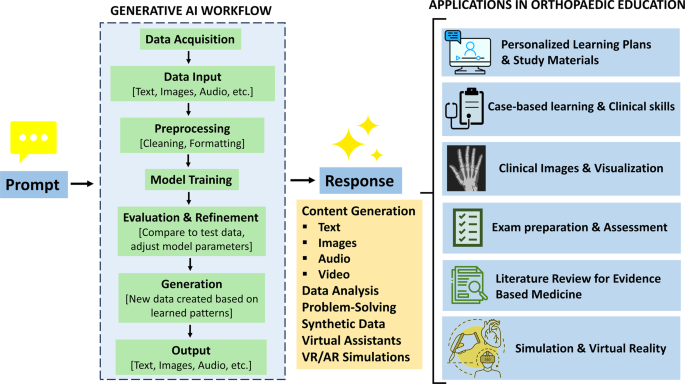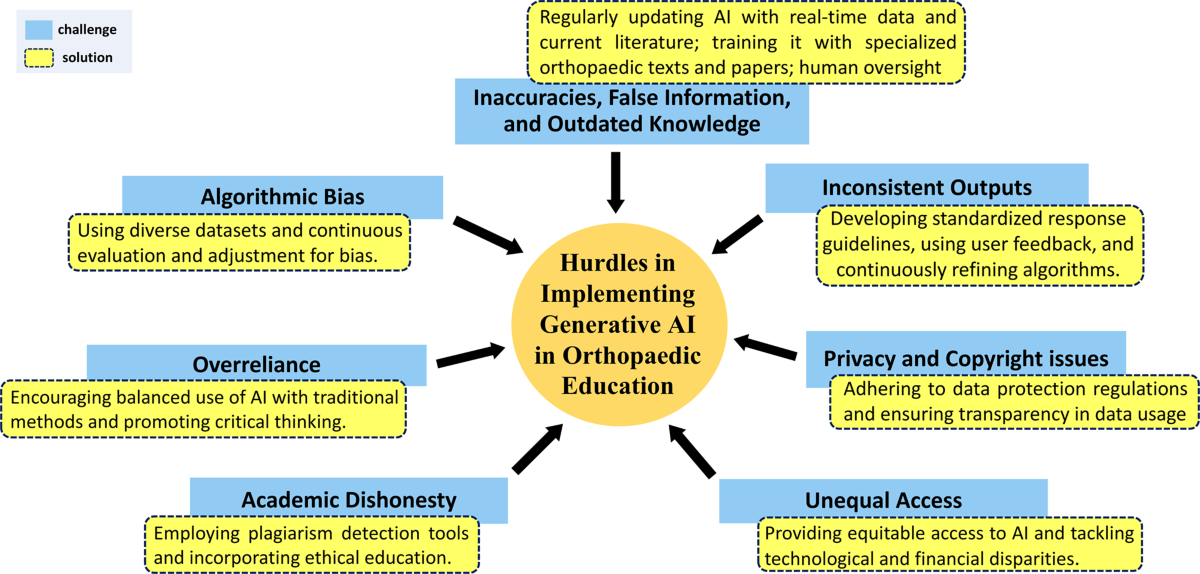Exploring prospects, hurdles, and road ahead for generative artificial intelligence in orthopedic education
Generative Artificial Intelligence (AI), characterized by its ability to generate diverse forms of content including text, images, video, and audio, has revolutionized many fields, including medical education. Generative AI leverages machine learning to create diverse content, enabling personalized learning, enhancing resource accessibility, and facilitating interactive case studies. This narrative review explores the integration of generative artificial intelligence (AI) into orthopedic education and training, highlighting its potential, current challenges, and future trajectory.
Integration of Generative AI in Orthopedic Education
A review of recent literature was conducted to evaluate the current applications, identify potential benefits, and outline limitations of integrating generative AI in orthopedic education. Key findings indicate that generative AI holds substantial promise in enhancing orthopedic training through its various applications such as providing real-time explanations, adaptive learning materials tailored to individual student’s specific needs, and immersive virtual simulations. However, despite its potential, the integration of generative AI into orthopedic education faces significant issues such as accuracy, bias, inconsistent outputs, ethical and regulatory concerns and the critical need for human oversight.

Although generative AI models such as ChatGPT and others have shown impressive capabilities, their current performance on orthopedic exams remains suboptimal, highlighting the need for further development to match the complexity of clinical reasoning and knowledge application. Future research should focus on addressing these challenges through ongoing research, optimizing generative AI models for medical content, exploring best practices for ethical AI usage, curriculum integration and evaluating the long-term impact of these technologies on learning outcomes.
Advancements in Artificial Intelligence
The rapidly increasing advancements in artificial intelligence (AI), deep learning, and machine learning (ML) have revolutionized a wide range of sectors, including business, healthcare, entertainment, and education. Generative AI, a component of ML which can generate content in a number of formats such as text, audio, images, video and computer code is finding applications in various fields such as content creation, data analysis, software development, virtual assistance, simulation, and personalized education.

Large language models (LLMs), a subset of generative AI are ML algorithms that employ vast amounts of text for analysis and generate responses. LLMs such as Chat Generative Pre-Trained Transformer (ChatGPT), a program developed by Open AI, and Gemini, formerly called Bard, built by Google AI, have gained popularity due to their ability to generate human-like replies and easy accessibility.
The Future of Orthopedic Training
The future of orthopedic training is constantly evolving, with technology playing a crucial role. To address the growing need for high-quality patient care, novel approaches to educating and training surgeons are required. The rapidly evolving field of AI could offer a way forward. The purpose of this narrative review is to explore the potential of generative AI in reshaping orthopedic education. By providing a structured overview of the applications and challenges associated with generative AI, this review aims to serve as a roadmap for educators as well as researchers interested in advancing orthopedic education through AI-driven innovations.

Section 1 of this paper provides an overview of the various forms and techniques of generative AI. Section 2 discusses...




















